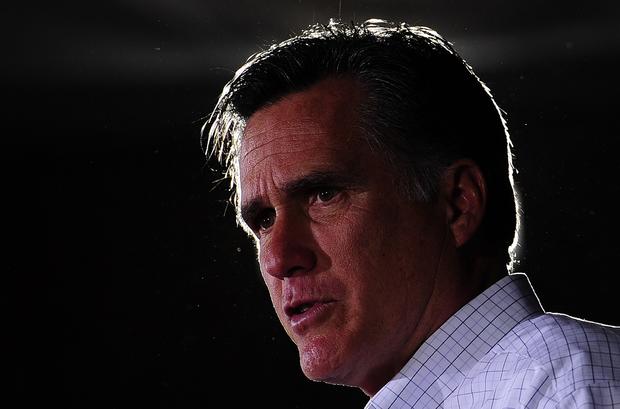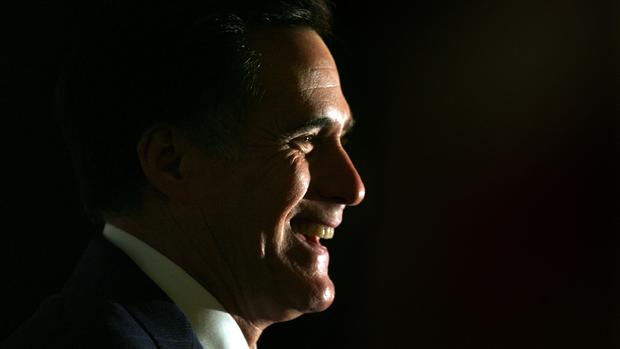Romney foreign policy team preps candidate for world stage
On paper at least, Mitt Romney has a long way to go before he can even think about sealing the Republican nomination.
But with several world trouble spots flaring up in recent weeks, Romney's foreign policy team is operating at a general election-like level in both size and scope. This robust group of advisers is busy preparing a former governor with limited experience in foreign affairs to be ready take over as commander-in-chief in less than a year.
Though world events continue to receive relatively short shrift on the trail, Romney has a deeply experienced team working on his behalf. Its members include high-level veterans of previous GOP administrations, prominent academics, and State Department and intelligence officials whose areas of expertise and backgrounds encompass a wide range of conservative foreign policy thought.
Three weeks ago, the campaign initiated a weekly foreign policy conference call with the more than 40 experts who are advising the GOP front-runner on international affairs, RCP has learned.
"People are taking a more serious approach every day," said one Romney foreign policy adviser.
As is the case with the candidate himself, who earned a joint business and law degree from Harvard, Crimson runs deep through the two Boston-based staffers who run the campaign's foreign policy shop on a day-to-day basis.
Policy director Lanhee Chen holds bachelor's, master's and doctoral degrees from the Ivy League institution, while the campaign's director of foreign and defense policy, Alex Wong, earned his law degree there.
A George W. Bush administration veteran who was also on board for Romney's first presidential run, Chen serves as the direct conduit to the governor on both domestic and foreign policy, while Wong helms the campaign's weekly foreign policy conference call.
Chen acknowledged that John McCain's 2008 strategy of portraying Obama as a dangerously inexperienced neophyte on the international stage is not an effective line of attack against an incumbent president, but he expressed confidence that Obama's record offered myriad vulnerabilities, despite several conspicuous military achievements, including killing Osama Bin Laden, the ouster of Moammar Gaddafi and winding down the war in Iraq.
"The argument about inexperience versus experience isn't primarily where the critique of the president is," Chen said. "I think the critique of the president has to do with what he's done in his time in office and how he's approached the world."
A Washington Post poll released Monday showed that foreign affairs and national security were two of Obama's strongest suits in the eyes of most Americans.
Among registered voters, Obama led Romney, 55 percent to 38 percent, when it came to the candidate respondents most trusted to handle international affairs, and the president bested the former Massachusetts governor by a nearly identical margin (54-38) on whom they trusted to handle international terrorism.
But while Romney has credited Obama for the bin Laden raid, the Republican has consistently made the case that the president has been feckless, eager to apologize to the rest of the world, and guilty of "appeasement" on the international stage.
The potential for full-scale civil war in Syria and the increasingly real possibility of Israeli military action against Iran are two key prospects that could test Obama's solid standing on foreign affairs in the coming months.
Romney has frequently cited as some of Obama's biggest failures Iran's unchecked progress toward acquiring a nuclear weapon and his administration's inability to tighten the reins on that nation's emboldened leader, Mahmoud Ahmadinejad.
Key members of Romney's foreign policy team argue that no matter what happens in the months ahead, Obama will be vulnerable in November on defense spending, his shaky relationship with Israel's leaders, and a "reset" policy with Russia that many observers see as ill-fated.
Most of all, Romney will continue to make the case that despite the president's emphatic avowals to the contrary, Obama sees himself as overseer to an inevitable decline of American power.
"The president saying that he's pursuing policies of an America in ascent doesn't make it so," Wong said. "If you look at his record going back three years, across the board he's implementing policies which, as he termed it, implement a doctrine in which America is supposed to 'recognize its limits.'"
As is the case with Romney's campaign apparatus as a whole, most members of the foreign policy team are veterans of his 2008 run and have personal relationships with the former governor going back at least five years.
Cofer Black, who was the director of the CIA's Counterterrorism Center on 9/11, generated scrutiny when he served simultaneously as vice chairman of the private security contractor Blackwater USA and as the head of Romney's counterterrorism policy advisory group in 2007 and early 2008.
Black has since left Blackwater and is back on board with the Romney campaign as a special adviser, where he works alongside more than 20 prominent members of the conservative foreign policy establishment, including former Secretary of Homeland Security Michael Chertoff, former NSA and CIA Director Michael Hayden, and former Missouri Sen. Jim Talent.
Former United Nations ambassador John Bolton endorsed Romney last month after flirting briefly with his own presidential run and has since taken on an active role providing advice to the candidate and advocating publicly on his behalf.
A hardliner on defense issues, Bolton was dispatched on Romney's behalf to South Carolina, Florida, and Minnesota ahead of each of those states' voting contests.
While aides say that Romney values Bolton's perspective, they are careful to note that the former Bush administration Iraq war hawk does not hold particular sway over the candidate.
In bolstering his own foreign policy credibility, Romney frequently cites the international contacts that he made during his decades-long business career, particularly his brief time working at The Boston Consulting Group alongside current Israeli Prime Minister Benjamin Netanyahu.
Romney met most recently with Netanyahu during a visit to Israel in January 2011 -- an excursion that also included stops in Jordan, the United Arab Emirates and Afghanistan, where he also met with President Hamid Karzai and U.S. Gen. David Petraeus.
During a trip to the United Kingdom last July, Romney visited British Prime Minister David Cameron and other UK leaders, but a Romney aide told RCP that currently there is no regular channel set up between the campaign and any foreign officials.
If Romney does become the presumptive nominee, the late-July opening of the 2012 Summer Olympics in London will provide an inviting opportunity for him to show off his international chops during the campaign lull that will likely precede the GOP convention in Tampa.
Romney has attended every Olympics since the 2000 Summer Games in Sydney and has been a member of the Olympic Movement since 1999, when he was named president and CEO of the 2002 Salt Lake City Winter Games, leading the effort to rescue that troubled operation from scandal and financial disaster.
Full CBS News coverage: Mitt Romney
More from RealClearPolitics:
Could Evangelicals Block Romney?
Romney Support Falls Back in States He Won



